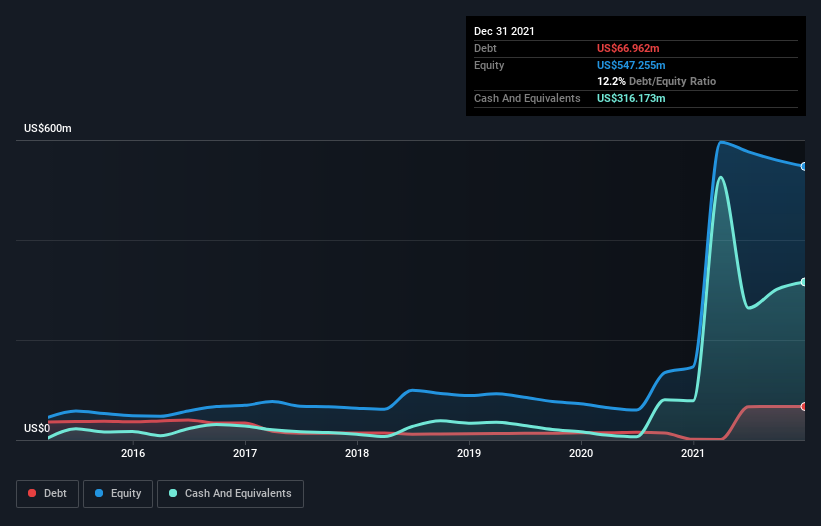
David Iben put it well when he said, 'Volatility is not a risk we care about. What we care about is avoiding the permanent loss of capital.' So it seems the smart money knows that debt - which is usually involved in bankruptcies - is a very important factor, when you assess how risky a company is. We can see that Gevo, Inc. (NASDAQ:GEVO) does use debt in its business. But should shareholders be worried about its use of debt?
When Is Debt A Problem?
Generally speaking, debt only becomes a real problem when a company can't easily pay it off, either by raising capital or with its own cash flow. In the worst case scenario, a company can go bankrupt if it cannot pay its creditors. However, a more common (but still painful) scenario is that it has to raise new equity capital at a low price, thus permanently diluting shareholders. Of course, the upside of debt is that it often represents cheap capital, especially when it replaces dilution in a company with the ability to reinvest at high rates of return. When we think about a company's use of debt, we first look at cash and debt together.
Check out our latest analysis for Gevo
What Is Gevo's Debt?
As you can see below, at the end of December 2021, Gevo had US$67.0m of debt, up from US$1.25m a year ago. Click the image for more detail. But it also has US$316.2m in cash to offset that, meaning it has US$249.2m net cash.

How Strong Is Gevo's Balance Sheet?
The latest balance sheet data shows that Gevo had liabilities of US$32.6m due within a year, and liabilities of US$86.6m falling due after that. On the other hand, it had cash of US$316.2m and US$2.48m worth of receivables due within a year. So it actually has US$199.4m more liquid assets than total liabilities.
It's good to see that Gevo has plenty of liquidity on its balance sheet, suggesting conservative management of liabilities. Because it has plenty of assets, it is unlikely to have trouble with its lenders. Succinctly put, Gevo boasts net cash, so it's fair to say it does not have a heavy debt load! The balance sheet is clearly the area to focus on when you are analysing debt. But it is future earnings, more than anything, that will determine Gevo's ability to maintain a healthy balance sheet going forward. So if you're focused on the future you can check out this free report showing analyst profit forecasts.
In the last year Gevo had a loss before interest and tax, and actually shrunk its revenue by 87%, to US$711k. To be frank that doesn't bode well.
So How Risky Is Gevo?
Statistically speaking companies that lose money are riskier than those that make money. And the fact is that over the last twelve months Gevo lost money at the earnings before interest and tax (EBIT) line. And over the same period it saw negative free cash outflow of US$112m and booked a US$59m accounting loss. With only US$249.2m on the balance sheet, it would appear that its going to need to raise capital again soon. Even though its balance sheet seems sufficiently liquid, debt always makes us a little nervous if a company doesn't produce free cash flow regularly. There's no doubt that we learn most about debt from the balance sheet. However, not all investment risk resides within the balance sheet - far from it. Case in point: We've spotted 3 warning signs for Gevo you should be aware of, and 2 of them don't sit too well with us.
When all is said and done, sometimes its easier to focus on companies that don't even need debt. Readers can access a list of growth stocks with zero net debt 100% free, right now.
New: Manage All Your Stock Portfolios in One Place
We've created the ultimate portfolio companion for stock investors, and it's free.
• Connect an unlimited number of Portfolios and see your total in one currency
• Be alerted to new Warning Signs or Risks via email or mobile
• Track the Fair Value of your stocks
Have feedback on this article? Concerned about the content? Get in touch with us directly. Alternatively, email editorial-team (at) simplywallst.com.
This article by Simply Wall St is general in nature. We provide commentary based on historical data and analyst forecasts only using an unbiased methodology and our articles are not intended to be financial advice. It does not constitute a recommendation to buy or sell any stock, and does not take account of your objectives, or your financial situation. We aim to bring you long-term focused analysis driven by fundamental data. Note that our analysis may not factor in the latest price-sensitive company announcements or qualitative material. Simply Wall St has no position in any stocks mentioned.
About NasdaqCM:GEVO
Flawless balance sheet with limited growth.
Similar Companies
Market Insights
Community Narratives




